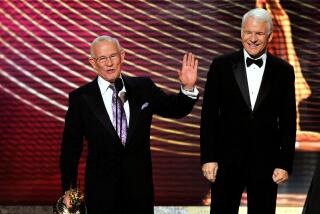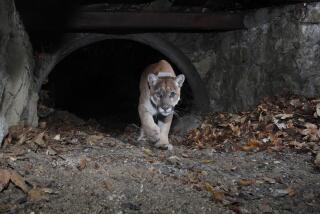A New Mel Emerges From ‘Velvet Fog’
- Share via
Singer Mel Torme says he lives by some advice he received from actor Charlton Heston: “I’m a working actor, and I’m determined to do it until I get it right.” Torme sounds like a straightforward guy with a work ethic, right? Forget it. He gives himself away in the next breath, referring to Heston’s simple motto as an “escutcheon.”
Escutcheon? By its dictionary definition, that’s “a usually shield-shaped surface carrying armorial bearings.” This little story begins to sum up Torme: He’s a hard-working singer with brains, a man of many moods and talents who has received mounds of critical praise but maintained a modest attitude through it all.
Torme, who plays Humphrey’s Concerts by the Bay this Sunday night at 7 and 9, has a hard time giving himself credit.
“You want to be very careful about rationales for popular singing; we’re not talking about the cure for cancer here,” he said. “But, within the range of my profession, I worked very hard at evolving. I view my career as a work in progress, a total learning curve. I have never felt, ‘This is it, I’m the complete finished singer!’ ”
If not complete--perhaps his modest range would keep him from that ultimate classification--Torme, 65, is among the best interpreters of the popular song working today. He sings with both emotion and creativity, adding nuance, inflection and improvisational twists with the skill of the best jazz instrumentalists.
And his recording career is more active than ever. Torme’s last release was the 1990 live recording titled “Night at the Concord Pavilion,” featuring a Big Band led by saxophonist Frank Wess and trumpeter Harry (Sweets) Edison. On it, Torme’s smooth voice oozes like honey through romantic ballads including a “Guys and Dolls” medley and a mini-tribute to Count Basie.
Torme also has three unreleased recordings ready, including a live date
with his trio, and his sixth collaboration with pianist George Shearing, due in August.
Shearing gets credit for putting the singer together with Concord Records, the respected Concord, California-based label where he has found an appreciative employer in Carl Jefferson, the company’s president.
“I was extremely disgusted over several of the alliances I had made with other record companies. I got sick of creative bookkeeping,” Torme said. “Months and months go by, and you wake up one morning, look in mirror, and say, ‘Where the hell is a (royalty) statement, even if it says, ‘You owe us $6,706?’ With Concord, you never have to do that. Everything’s right on time.
“George brought me to Carl Jefferson, who I had always liked, and I made my first album for Concord in 1983 (“An Evening with George Shearing and Mel Torme) and won a Grammy for it.”
While developing as a singer, Torme also exercised many other creative muscles over the years. He has handled his own arranging since the 1960s, a talent for which he predictably takes little credit, arguing that lyrics are more important than music.
“I think lyrics are 99.6% of what a song is all about. Lyrics are the cake, the melody is the frosting,” he said. “They tell me, the reviewers, the writers, even other performers, ‘You do realize, Mel, that you’re the only singer in the whole business who writes his own arrangements.’ I guess that’s true. If it is, having never studied music--my arranging is a painful process.”
At times, Torme has also been an actor, television personality and writer.
He had his own 1/2-hour TV talk show on CBS in the early 1950s, won an Emmy for his acting in a televised drama titled “The Comedian” in 1957, wrote and starred in the 1974 movie “Snowman” and has a cameo as Priscilla’s Presley’s dance partner in the new movie, “Naked Gun 2 1/2.”
Torme’s biography of drummer Buddy Rich is due in September, and he is at work on a novel set in the gang culture of East Los Angeles.
Early in life, Torme exhibited extraordinary artistic gifts. He made his stage debut as a toddler in Chicago, where he grew up.
“My uncles and my dad were compulsive singers,” Torme recalled. “When I was 4, they took me downtown to the Blackhawk restaurant. I was sitting ringside, and they saw me tapping away, singing along. One of the band leaders said, ‘What’s with this kid? He knows everything we do?’ They pulled me on stage, and I sang, ‘You’re Driving Me Crazy.’ They thought this was very droll, and they hired me to come in every Monday night for $15 to sing at least one or two songs as a novelty act. I couldn’t wait for Monday nights to come around. I’m afraid I was rather precocious. I’ve never had stage fright.”
The young Torme was discovered by radio and had a career as a childhood radio actor from 1933 to 1941. Though he made his first recording in 1945 and became known in the 1950s as a leading Cool Jazz-era vocalist for the albums he made with pianist Marty Paich and a group called the Dek-Tette, Torme doesn’t consider his earliest work to be his strongest--the first 29 years worth, to be exact.
“I felt that most records I had made, I was blessed with wonderful arrangers, but, up until a recording I made in 1974 (“Live at the Maisonette”), you can keep the rest. I didn’t like them, I didn’t like the sound of my voice, I didn’t think I would ever become an acceptably attractive sounding singer on record.
“On that record, I felt I had turned a corner, my singing had become palatable and acceptable. And I think I’m singing a helluva lot better now. If I’m still ambulatory, I hope I can say that to you again in 10 years.”
The subject of Torme’s continued evolution makes you wonder about the one thing that hasn’t changed over the years: his longtime nickname, “The Velvet Fog.”
“Fred Robbins was on the radio in New York in the mid- and late-1940s. He just started to play my records, calling me this nickname that he felt was descriptive of my vocal qualities in those days--I was hoarse, foggy. But I think I’ve changed. It’s not fitting now. It’s erroneous.”
Asked to suggest a more fitting nickname, Torme was surprisingly speechless for several seconds.
“What was Sinatra’s great line? He lives by the three Cs--credibility, consistency and concentration. I live by those three Cs as well. Or you could just call me the New Mel.”
At Humphrey’s, the New Mel will be backed by a trio including his longtime drummer Donny Osborne, pianist John Colliano and bassist John Leitham. On July 17, he will perform a tribute to Duke Ellington at the Hollywood Bowl.
* Mel Torme plays Humphrey’s Concerts by the Bay on Sunday at 7 and 9 p.m.
More to Read
The biggest entertainment stories
Get our big stories about Hollywood, film, television, music, arts, culture and more right in your inbox as soon as they publish.
You may occasionally receive promotional content from the Los Angeles Times.









